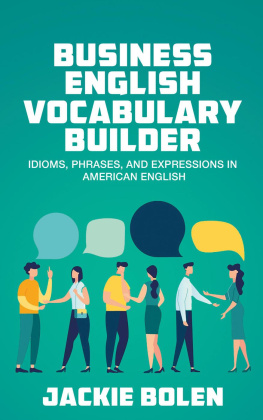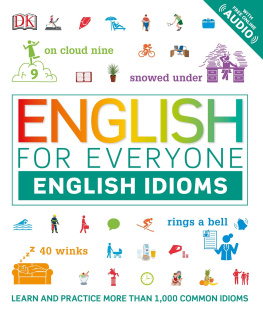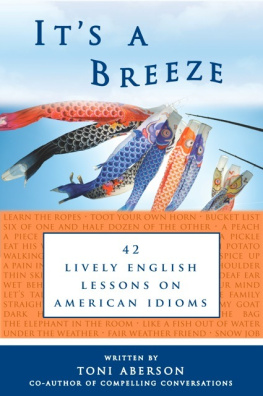An idiom is a phrase or a expression that has a figurative, or sometimes literal, meaning. An idiom's figurative meaning is different from the literal meaning. English Words and Expressions explains and tells stories of the idioms that many learners of American English find difficult to understand.
Learn English as you read and listen to the descriptions and stories of American English Idioms. Adaptations are written at the intermediate and upper-beginner level and are read one-third slower than regular English.
Heard It Through the Grapevine
PLAY AUDIO

Some of the most exciting information comes by way of the grapevine.
That is so because reports received through the grapevine are supposed to be secret. The information is all hush hush. It is whispered into your ear with the understanding that you will not pass it on to others.
You feel honored and excited. You are one of the special few to get this information. You cannot wait. You must quickly find other ears to pour the information into. And so, the information - secret as it is begins to spread. Nobody knows how far.
The expression by the grapevine is more than 100 years old.
The American inventor, Samuel F. Morse, is largely responsible for the birth of the expression. Among others, he experimented with the idea of telegraphy sending messages over a wire by electricity. When Morse finally completed his telegraphic instrument, he went before Congress to show that it worked. He sent a message over a wire from Washington to Baltimore. The message was: "What hath God wrought?" This was on May 24th, 1844.
Quickly, companies began to build telegraph lines from one place to another. Men everywhere seemed to be putting up poles with strings of wire for carrying telegraphic messages. The workmanship was poor. And the wires were not put up straight.
Some of the results looked strange. People said they looked like a grapevine. A large number of the telegraph lines were going in all directions, as crooked as the vines that grapes grow on. So was born the expression, by the grapevine.
Some writers believe that the phrase would soon have disappeared were it not for the American Civil War.
Soon after the war began in 1861, military commanders started to send battlefield reports by telegraph. People began hearing the phrase by the grapevine to describe false as well as true reports from the battlefield. It was like a game. Was it true? Who says so?
Now, as in those far-off Civil War days, getting information by the grapevine remains something of a game. A friend brings you a bit of strange news. "No," you say, "it just can't be true! Who told you?" Comes the answer, "I got it by the grapevine."
You really cannot know how much if any of the information that comes to you by the grapevine is true or false. Still, in the words of an old American saying, the person who keeps pulling the grapevine shakes down at least a few grapes.
Heart Expressions
PLAY AUDIO

We will try to get to "the heart of the matter" to better- understand the most important things about words and their stories. So take heart. Have no fear about learning new expressions. Besides, popular English words can be fun. There is no need for a heavy heart. Such feelings of sadness would only break my heart, or make me feel unhappy and hopeless.
Now, let us suppose you and I were speaking freely about something private. We would be having a "heart-to-heart" discussion. I might speak "from the bottom of my heart," or say things honestly and truthfully. I might even "open up my heart" to you and tell a secret. I would speak "with all my heart," or with great feeling.
When a person shares her feelings freely and openly like this, you might say she "wears her heart on her sleeve," or on her clothing. Her emotions are not protected.
If we had an honest discussion, both of us would know that the other person's heart is "in the right place." For example, I would know that you are a kind-hearted and well-meaning person. And, if you are a very good person, I would even say that you have "a heart of gold." However, you might have "a change of heart" based on what I tell you -- our discussion might cause you to change the way you feel about something.
But, let us suppose you get angry over what I tell you. Or worse, you feel no sympathy or understanding for me or my situation. If this happens, I might think that you have "a heart of stone." And, if you say something to make me frightened or worried, my heart might stand still or "skip a beat."
Yet, even though you may be angry, I would know that at heart, you are a kind person. In reality, you do care. And any argument between us would not cause me to "lose heart," or feel a sense of loss.
"My heart goes out" to anyone who loses a friend over an argument: it really is a sad situation, and I feel sympathy for the people involved.
I promise that what I have told you today is true "cross my heart.
Hit the Spot, Hit Bottom, Hit the Books
PLAY AUDIO

"Hit" is a small word, but it has a lot of power. Baseball players hit the ball. Missiles hit an airplane. A car hits a tree.
"Hit" also joins with other words to create many colorful expressions. One is "hit the road." It means to travel or to leave a place, as suggested in this song "Hit the Road."
Another common expression is "hit the spot." At first it meant hitting a spot at the center of a target with an arrow. Someone who did so was satisfied with his shooting. Now, hitting the spot usually means that a food or drink is especially satisfying.
Many years ago, Pepsi Cola sold its drink with a song that began "Pepsi Cola hits the spot, twelve full ounces, that's a lot..."
Another expression involving hit is "hit bottom." Something that has hit bottom can go no lower. If the price of shares of a stock hits bottom that might be the time to buy it -- its value can only go up.
A student who tells you his grades have hit bottom is saying he has not done well in school.
When a student's grades hit bottom it is time to "hit the books." "Hit the books" is another way to saying it is time to study. A student might have to tell her friends she cannot go with them to the movies because she has to "hit the books."
Not hitting the books could lead to an unpleasant situation for a student. The father or mother may "hit the ceiling" when they see the low grades. Someone who hits the ceiling -- the top of the room -- is violently angry. A wife may hit the ceiling because her husband forgot their wedding anniversary.
To build something of wood, you usually need a hammer. That is what you use to hit nails into the pieces of wood to hold them together. When you "hit the nail on the head" -- exactly on its top -- it goes into the wood perfectly. And when someone says your words or actions "hit the nail on the head" he means what you said or did was exactly right.

















